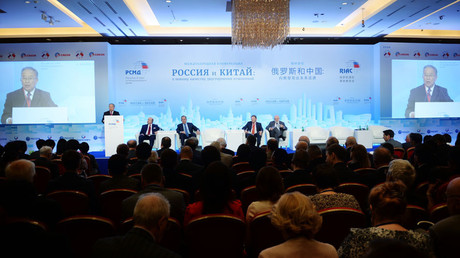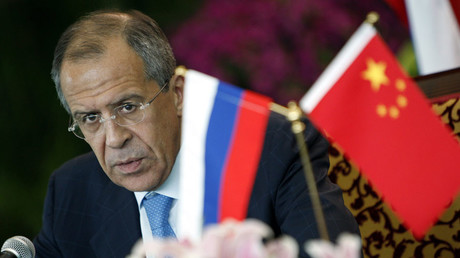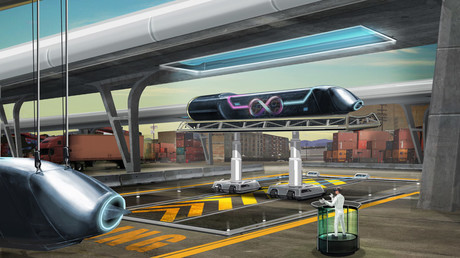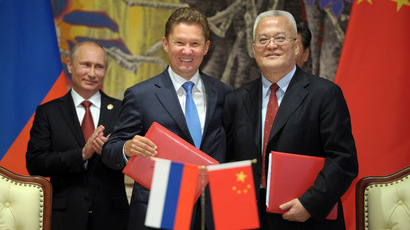Published time: 23 Jun, 2016 07:02
Russian President Vladimir Putin has welcomed the expansion of the Shanghai Security Organization in an interview with Xinhua, noting that the association is gaining relevance outside the region and inspiring respect worldwide.
President of Xinhua News Agency Cai Mingzhao:Mr. President,
I am greatly honored and pleased to have this opportunity to interview you in your hometown prior to your visit to the People's Republic of China.
First of all, I would like to express on behalf of the Xinhua Agency our sincere respect.
President of Russia Vladimir Putin: Thank you.
Cai Mingzhao:With your – and President of the People's Republic of China Xi Jinping's active involvement and support Chinese-Russian relations have already reached an extremely high level.
I would like to ask you some questions, if I may.
Last year, you met with the Chinese President five times. With your engagement and assistance, as well as through the efforts made by you and Mr. Xi Jinping Chinese-Russian collaboration has been constantly deepening and enhancing.
In your opinion, what areas of cooperation between Beijing and Moscow would you describe as priority ones at the moment? What areas are to be developed in the future? And what do you think of the expectations related to your upcoming visit to China?
Vladimir Putin: In fact, you already defined our relations when you said they were at a very high level.
I would now draw the attention of our readers to two dates. 25 years ago, we announced the launch of new relations, those of strategic partnership, and 15 years ago, we signed a friendship and cooperation treaty. Since then, hard work has been done resulting in an unprecedented level of mutual trust on which our collaboration is built.
As we had never reached this level of relations before, our experts have had trouble defining today's general state of our common affairs. It turns out that to say we have strategic cooperation is not enough anymore. This is why we have started talking about a comprehensive partnership and strategic collaboration. "Comprehensive" means that we work virtually on all major avenues; "strategic" means that we attach enormous inter‑governmental importance to this work.
You mentioned my interaction with the President of the People's Republic of China. This is very true. Of course, our joint work, work at this level gives positive momentum to our relations. At our level, we discuss the key strategic aspects of our cooperation.
Mr. Xi Jinping devotes much of his personal attention to the development of Russia-China relations. He is a very good friend and a reliable partner.
Nonetheless, our efforts alone would have been insufficient for the successful development of ties between Russia and China. Naturally, this called for the establishment of a mechanism to ensure cooperation between the governments of the Russian Federation and the People's Republic of China. The heads of Governments of both states hold regular meetings. Over two dozen subcommittees – I believe there are 26 of them – and intergovernmental commissions have been created and are operating very effectively and intensely. It is not always possible to agree on complex matters from the outset, but we address all the issues, however complex they might be, with the common goal in mind of fostering our cooperation - and we always find solutions.
The existing problems in the world economy have also had an impact on our collaboration, leading to a certain drop in the total trade turnover, but we are convinced that it is a temporary phenomenon resulting from the current situation with certain goods and the exchange rate.
Nevertheless, we manage to settle the key issues. We manage to take major steps to improve our trade structure.
I am not sure about the exact figures, here we should consult the relevant reports, last year has seen a considerable increase, of 44 per cent, I believe, in our export of engineering products to the People's Republic of China. That is highly important for us. We have been discussing this issue with our Chinese partners for years. I would like to thank our friends for our success in establishing such collaboration in this essential area and achieving the set goals. Those were our common goals. We agreed upon them, and we are now moving in the right direction.
In this regard, one of the most important directions is of course the diversification of our ties, making them more sophisticated, paying more attention to the high-tech area of our collaboration.
We also work together on space programs, in the sphere of aviation, on the construction of a wide-body aircraft and a heavy helicopter. We collaborate on environmental issues, and carry on with large-scale energy projects, including in nuclear energy.
Cai Mingzhao: The Russian side has very good competitive advantages in this area.
Vladimir Putin: That is true. Our Rosatom has a large stock of orders. The two units of the Tianwan Nuclear Power Plant have been operating for 8 years now, and have proved reliable.
We are currently working on another two units, and I think more could be done. We should enhance our cooperation not only in terms of increasing the number of nuclear power plants in China but also by expanding our scientific and technical collaboration in this area.
China is increasing its presence in our energy market, it is a major shareholder in one of our significant projects, Yamal LNG, and it has acquired 10 percent of the shares in one of our leading chemical holdings, SIBUR. We welcome these Chinese investments not only as a means of placing financial resources but also as a means of further developing our partnership.
Intensive work is underway on the famous Moscow-Kazan High-Speed Rail Line Project. Some railway sections will allow for a train speed of up to 400 kilometers per hour. We pay considerable attention to these prospects; this can be only the beginning of our large-scale infrastructure cooperation.
Our interaction in the humanitarian field is no less important. Thus, we have held cross‑years of China in Russia and Russia in China, the Year of Youth Exchange, the Year of the Russian Language and, accordingly, the Year of the Chinese Language, the Year of Tourist Exchange, etc. Some events were initiated by the Russian side, and others – by the Chinese side; but they all have been very successful and will undoubtedly contribute to building an atmosphere of confidence between our peoples. These projects are as important as, for example, those in the energy sphere, such as the huge Power of Siberia project to supply up to 38 billion cubic meters of Russian gas per annum via a newly established eastern route from Russia to China. Add to this diplomatic, military, and military-technical cooperation.
We usually discuss all these issues at our joint meetings. As you see, the agenda is extensive if not huge. Therefore, I am looking forward to substantive negotiations, intensive ones. They are always held in an atmosphere of amity and mutual trust.
Cai Mingzhao:You have just mentioned important projects in the economic area between Russia and China. We are greatly inspired by these big projects. Cooperation between Russia and China has an immense potential. You often stress the need to converge integration processes, in particular regarding the Eurasian Economic Union and China's Silk Road project. Our business circles also pay attention to this issue.
What concrete steps will be taken to develop this cooperation? And how will this cooperation help improve the Russian-Chinese trade and economic interaction?
Vladimir Putin: You have touched on a very interesting and complex subject. As we know, President Xi Jinping has launched an initiative to revitalize the very idea of the Great Silk Road. We believe it is a very timely, interesting and promising initiative aimed at increasing cooperation with all countries of the world, but primarily with neighbours, because wherever the road goes, it first runs through neighbouring territories.
We are engaged in negotiations on two tracks: China-Russia, bilaterally, and China-Eurasian Economic Union. A short while ago, at a meeting in Astana with my counterparts from the Eurasian Economic Union, which currently comprises five countries, we discussed this possibility and came out in favour of enhancing cooperation with China, drawing on President Xi Jinping's idea to develop the Silk Road Economic Belt.
To put it bluntly, these issues clearly call for expert examination. We certainly care about the interests of our national producers. However, there is a common understanding that the general development path in a global economy, as well as in our cooperation with China, should involve a gradual removal of all barriers to open collaboration. In the initial stages, it could imply the establishment of a free-trade zone.
Being realists, we understand that at the beginning there will inevitably be faults and exceptions. Still, we should outline the way forward. While progressing towards this goal, we will pave the way for what I have called today “cooperation in Eurasia”, since an increasing number of countries in the region show interest in such collaboration. At the same time, we will seek to avoid shaping exclusive trade and economic blocs.
Cai Mingzhao:The Shanghai Cooperation Organization will shortly hold its regular summit in Tashkent. Russia and China actively cooperate within various international organizations, primarily within the SCO, which was established 15 years ago. The SCO is an essential element in ensuring stability and security in the region.
What is your vision of the further development of this Organization? What role, in your opinion, will it play in the future, both regionally and globally?
Vladimir Putin: This Organization, when it was first created, set itself quite modest goals, which I would say were important but at the same time practical. These included the settlement of various issues of cross-border cooperation, complex as well as simple ones. As we know, such border issues may remain in limbo for decades if goodwill is lacking, and are promptly settled when there is enough goodwill. This most likely depends on the mood, on the philosophy adopted by a state in its international relations.
It is thanks to this very goodwill that Russia and China, as well as other members of the Shanghai Cooperation Organization, have fulfilled the tasks they set themselves in this area. We came to understand that such a mechanism, along with its valuable outputs and the level achieved in relations between our countries, should not be wasted. Therefore, we actually began using the established mechanism to address other issues, first of all developing our cooperation in various areas, such as political cooperation and cooperation in infrastructure development. We also launched discussions on security, on combatting the drug threat and other issues.
I would not say that we have made astonishing progress or carried out any high-profile activities; yet the Organization has become highly demanded and attractive in the region, and many countries of the world have expressed their willingness to join it.
At the summit held last year in Ufa, Russia, we decided to admit to the SCO another two states, India and Pakistan. We are to formalize this decision at the Tashkent meeting. We will also consider the intentions of other countries to join our work.
Indeed, as the Shanghai Cooperation Organization expands its areas of operation and its membership through the participation of the powerful countries I have just mentioned, it turns into a very powerful international association that commands respect and is relevant both in the region and worldwide.
The international environment is complicated and multifaceted, and issues are not resolved by the mere fact that countries with different approaches to and views on various international challenges join our Organization. However, as we expect, their accession does create conditions for the issues to be resolved.
Cai Mingzhao:Mr. President, I know that your schedule is tight and your time is of high value. I have a rare opportunity to interview you personally. May I ask you one more question?
Vladimir Putin: Fine.
Cai Mingzhao:Crises abound in the modern world. We face economic downturns, serious terrorism-related problems, and challenges caused by climate change. Russia and China are responsible major powers addressing international issues. What other efforts in your view could our countries make in order to safeguard peace and reform global governance?
Vladimir Putin: You know, today the very fact that China and Russia collaborate in international affairs contributes to the stability of world affairs.
Let me remind you of the statement made by the President of the People's Republic of China at the 70th anniversary of the United Nations. Think back and recall it. That statement called for resolving all contentious issues only by peaceful means on the basis of international law. Furthermore, the President was among the few who declared that they were ready to help those in need and even specified those proposals. It is such approaches that unite us in international affairs, not merely the geographic proximity of our countries.
Apart from our joint work in the Shanghai Cooperation Organization, we cooperate within BRICS, which in fact was jointly established by us, and we actively collaborate at the UN.
I would take the liberty to recall that it was this country, the Soviet Union at that time, which made every effort to give the People's Republic of China its deserved place among the permanent members of the Security Council. We have always believed that this is the place for the People's Republic of China. Today, we are particularly pleased that this has happened, since our views on international affairs, as diplomats say, are either very similar or coincide. At the same time, this similarity or coincidence is backed by concrete work, including efforts on the technical level. We are in constant contact and we consult on global and regional issues. Since we consider each other close allies, naturally, we always listen to our partners and take into account each other’s interests.
I am certain that our joint work during my visit to the People's Republic of China will proceed in the same way.
Cai Mingzhao:Mr President, thank you very much. We also look forward to your visit to China. We would like to wish you every success during your upcoming visit to the PRC.
I would also like to inform you that the Xinhua Chinese News Agency and the TASS News Agency are to sign a new agreement on cooperation during your visit to China.
Vladimir Putin: Thank you for your assistance in this area since media support is just as important as the substantive work done by diplomats in the modern world, as they say.
Thank you very much.
Source: https://www.rt.com/politics/official-word/347878-putin-xinhua-interview-china/
Source: https://www.rt.com/politics/official-word/347878-putin-xinhua-interview-china/




No comments:
Post a Comment